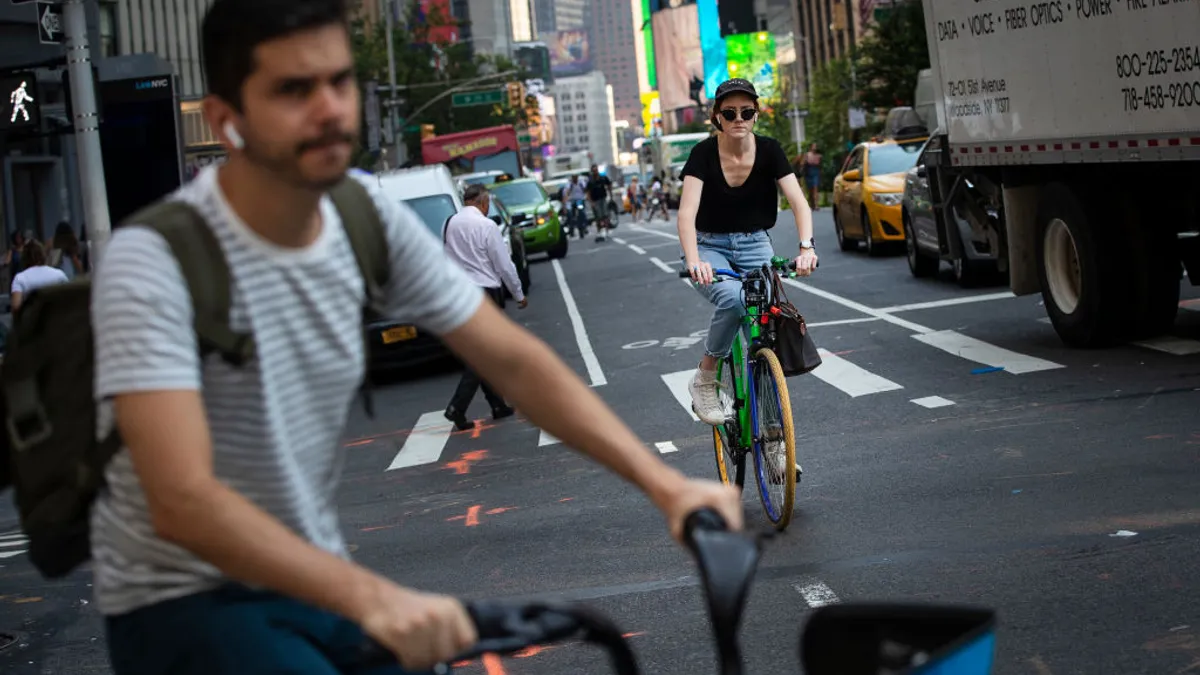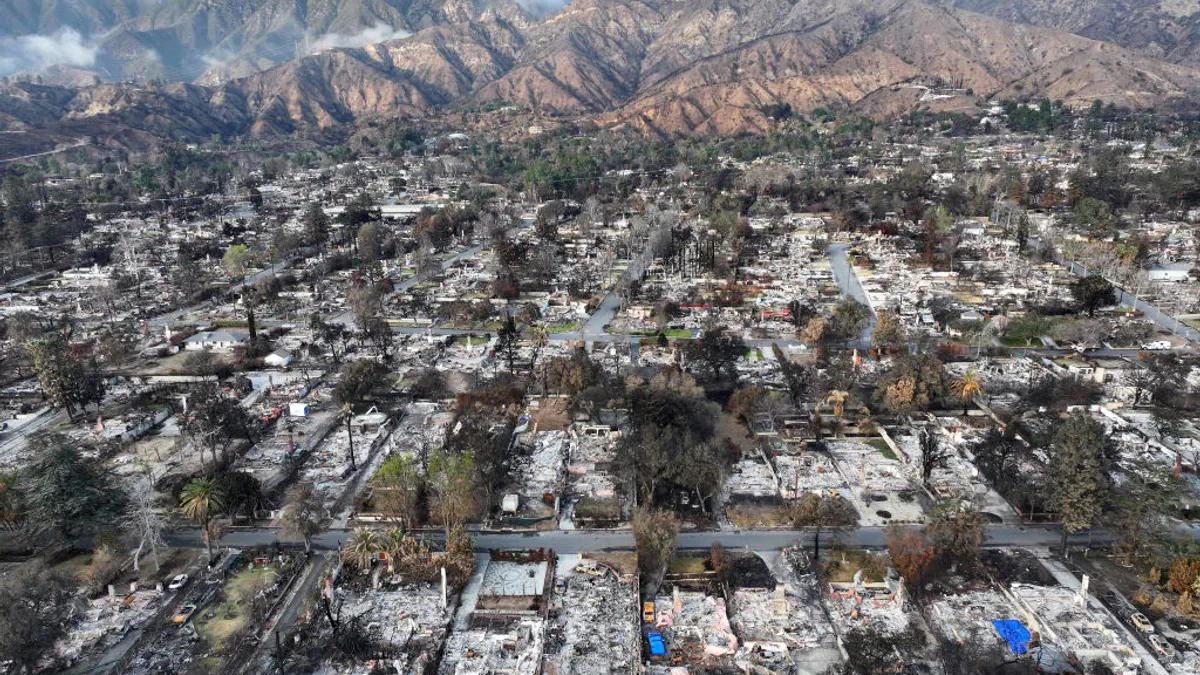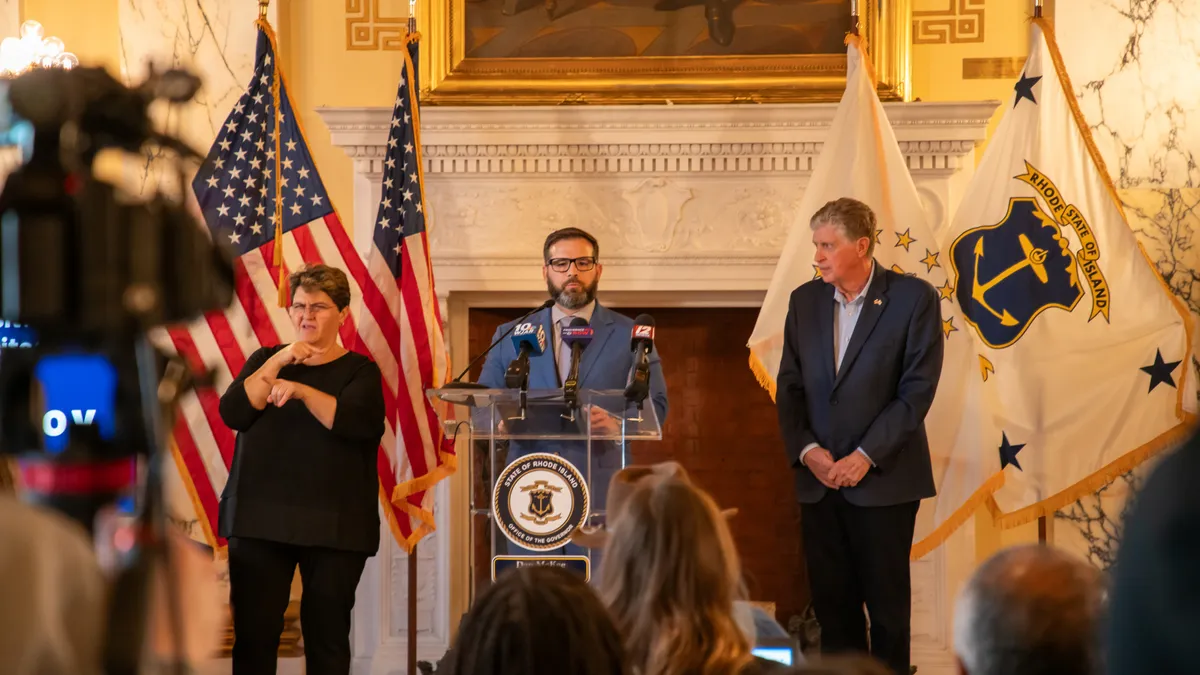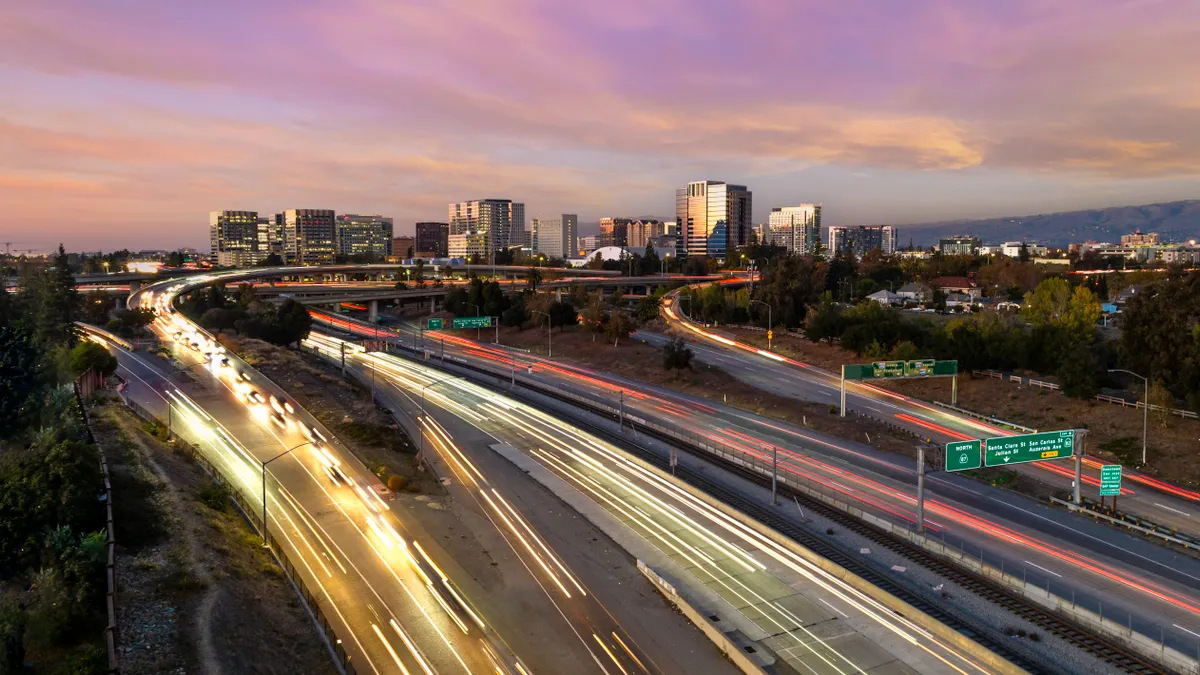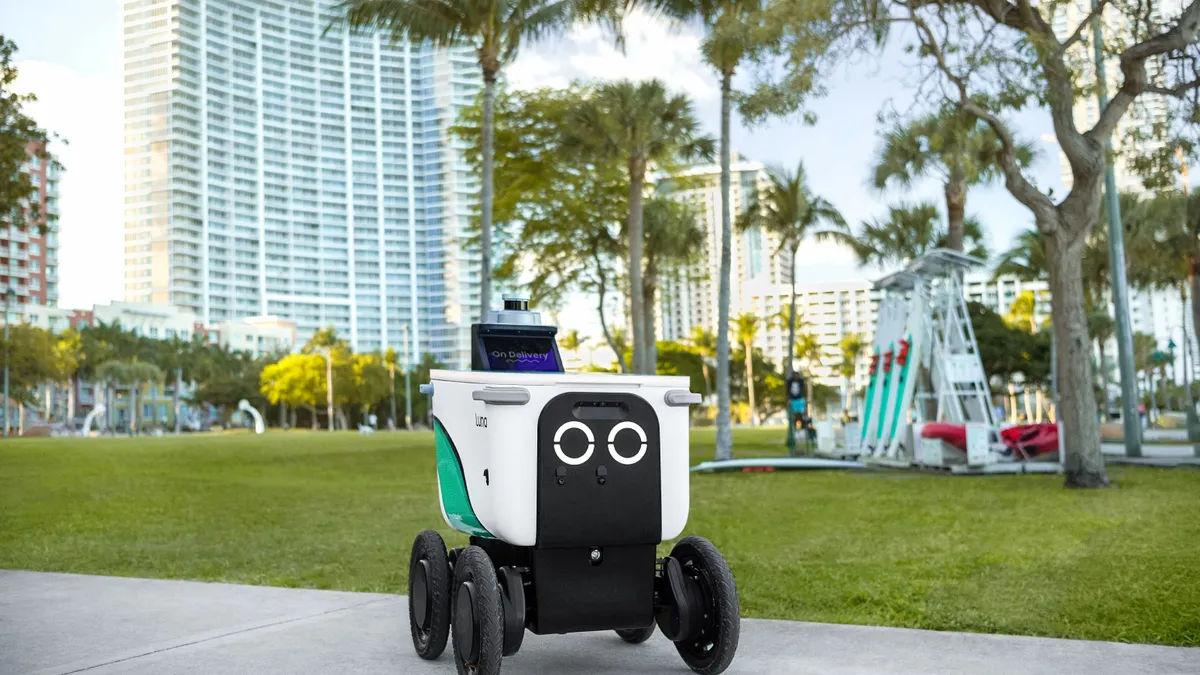As cities adapt to the many changes the pandemic has helped fuel — including an influx of remote work, decreased transit ridership and new traffic patterns — local leaders are turning to data to make better decisions.
In that work, they are also turning to companies like Sidewalk Labs spinoff company Replica, a platform that provides cities with data about their built environment that encompasses mobility, spending habits, land-use, water and energy. The company's "superpower," according to CEO Nick Bowden, is producing privacy-friendly, high-fidelity data to help government agencies make better policies and decisions.
In the case of mobility, for example, the software tool allows to use "de-identified" mobile location data to predict what modes people will use to travel throughout the city, when they will travel, and the purpose of that travel. Those factors can help inform decisions tied to congestion, bike lanes, infrastructure investments and more.
Smart Cities Dive caught up with Bowden to discuss how cities are using data today, lessons learned from the company's headline-making dissolution with Portland Metro last year and advice for city leaders who want to be mindful of privacy.
The following interview has been edited for clarity and length.
SMART CITIES DIVE: We are approaching the nearly two-year anniversary of initial pandemic shutdowns that completely disrupted urban planning. What are the key ways you’ve seen the pandemic impact urban planning?
NICK BOWDEN: There are two or three big points here. So one, for white-collar work … prior to COVID, most people largely had to live in the city they worked in across sectors. About 5% of people pre-COVID were regular telecommuters. Now, around 20% of people effectively can work from home or remotely in perpetuity. It's a pretty significant change that for the first time in the history of the U.S., [there’s] a complete disconnect between location and work location for roughly a quarter of working people.
Those people will have a lot more freedom of movement and where they choose to live is much more based on the quality of life factors more so than where they can get a job. That's going to take several years to play out. But you’re already seeing that the beneficiaries of that, frankly, are probably New York and Miami and Austin that have really targeted what we’ll call the free agent working class that now can work from anywhere.
Bucket two, though, is that a large number of people still have to live where they work. And now they have considerations around safety and how to get to work that didn’t exist before, while still having all the same pressures of, 'How do I get my kids to school? How do we get to a job?' For that group of folks, they continue to be adversely affected in many cities because transit service has either been cut or the schedule is not what it once was. You got this other group that happens to be the majority, by the way, that is now dealing with a pretty significant change in access.
My personal hope would be that those folks don't get left behind, but there's a lot of downward pressure right now in transit agencies. You got ridership that is still in a lot of cases less than 50% pre-pandemic. They are now being forced to either trade-off service in terms of the frequency and/or coverage, having to pick one or the other versus trying to do both. It feels like that's all going to take a couple of years to play out but it’s not insignificant in terms of how cities function.
Interesting. I'd imagine that your data would be helpful for cities to figure out how to respond to the changes to their urban cores. Is that something that cities are coming to you to address?
Yeah, I think that generally, an agency's work falls into a couple of buckets. There’s something that I would refer to as strategic work such as big policy decisions like congestion pricing in New York or L.A. These are high-magnitude changes that can really have a bunch of different impacts. So we do a lot of work that tends to oftentimes deal with — at least in the case of both L.A. and in New York — how people use the central business district.
There's a second bucket of work that I'll call more traditional planning work. And so infrastructure would fall into that.
The third bucket of work tends to be operational. So it’s very focused on the short term, we’ll call it congestion management. It's probably the thing that — over time, hopefully, if we make better investments in land use and make better investments in transit — [there will be] less of that kind of work... and all of those in some way, shape or form end up touching a lot with the urban development.
You've got lots of cities that are hopefully finally considering getting rid of the major interstate system that goes through downtown or making a better investment in transit. It's not that coming up with those solutions is the hard part. That's the easy part. It's trying to figure out [what the implications are] to all the various kinds of parts of downtown.
If we get rid of the interstate system that surrounds the downtown, obviously it sounds great from an urban development perspective but it comes with trade-offs, right? You might increase travel times, or you might change the way that people have to get to and from work or any number of other things. And so I think data gets used a lot [as a] common operating picture to figure out what you need with these kinds of big proposed policy changes or infrastructure improvements.
I'd assume that a lot of cities are turning to the most up-to-date data to address those changes. What advice would you give city leaders looking to balance resident privacy with the need to also provide the most reliable and effective data-informed city services?
We started the company because we felt like that was a bad tradeoff that agencies had to make — that you could either have good data or privacy-friendly data but you couldn’t have both of those things. You can have both of those things.
There are opportunities to take advantage of new data and new tools without having to be a privacy expert. Oftentimes, public agencies don't have that depth of specialization in and around data privacy. They've had to make the tradeoffs that you described, and you don't have to do that anymore.
There are two mistakes that we see agencies make when they're thinking about data. The first is that they want data. I say this all the time but data is not going to solve any problems itself. Data is not going to reduce congestion. Data is not going to increase transit ridership. Data is not going to densify your downtown core. I think it can often tend to be a mistake to be like, “If we just have more data, this stuff will be easier.” There can be a tendency with agencies to think let's get data and oftentimes [they] end up being disappointed because they haven't really thought through the operational implications and the capabilities and capacity that they want to have on their team to really take advantage of whatever data they have.
So the first piece of advice is to pick a big problem that you're trying to solve and really focus a lot of your initial data efforts on getting familiar with using data on a top-of-mind, important problem versus just getting data.
I think bucket two is really more of a cultural thing, but data plays into it. The way that a lot of these agencies are set up is they are very [siloed]. So land use folks think about land use, and transportation folks think about transportation. The degree that different disciplines can have access to and use from other disciplines can actually really help identify better levers or better policies. I don't know if that’s a natural thing for a lot of agencies to think like that because their org structures aren't oriented like that.
But those are the two big pieces of advice: Have a purpose for your data number one, and then make sure that you're actually bringing all of the various folks that could be impacted by that kind of decision into the data world and give them access.
Privacy disagreements were also at the core of Replica's work with Portland Metro in 2021. It's been almost a year since that project got shelved. What are some learning lessons you've taken away from that effort?
We are not in the business of being a facilitator of significant privacy risk. We don’t buy data from one person and then pass it to a city… It has a whole set of privacy implications. And, frankly, as a secondary, it's not very useful because it's just this big stream of random data. So despite the privacy issues, it's not structured to be very useful.
Our value proposition is such that we do a lot of that work because we're just really lucky to have people who are really sophisticated when it comes to using really sensitive data in a small sample and figuring out how to apply privacy to get [the data] to be useful.
And to your question, I think one of the takeaways from Portland on our side is we just have to be really clear about what we think the value that we provide is. And in some cases, that may not be what an agency wants. The agency may say, "You know what, we're willing to deal with the privacy implications and having the raw data and dealing with the fact that it's really hard to use." In those cases, Replica is not going to be the right company for that. I think a lot of what Portland boils down to is we just weren't the company for what they wanted, and that's not right or wrong. It’s just not what we do.



